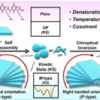Sesame (Sesamum indicum), a vital oilseed crop, is cultivated globally for its nutritional and economic value. The differentiation of floral and vegetative tissues is a pivotal process in plant development, impacting yield and the overall lifecycle of the plant. The findings suggest that the newly identified microbe possesses the ability to interfere with the hormonal pathways that govern floral development, effectively triggering a regression to a non-reproductive, vegetative phase.
This microbial influence has significant ramifications for sesame cultivation. Farmers may find new strategies to enhance growth patterns or mitigate premature flowering, which could ultimately lead to improved yield potentials and resource allocation. Moreover, this discovery opens avenues for the exploration of microbial applications in agriculture, allowing for biologically-based interventions in crop management.
The implications of this research extend beyond the agricultural sphere, providing insights into the complex relationships between plants and their microbiomes. Understanding how microbes can modulate plant developmental pathways offers an enriched perspective on plant resilience and adaptability in changing environmental conditions.


